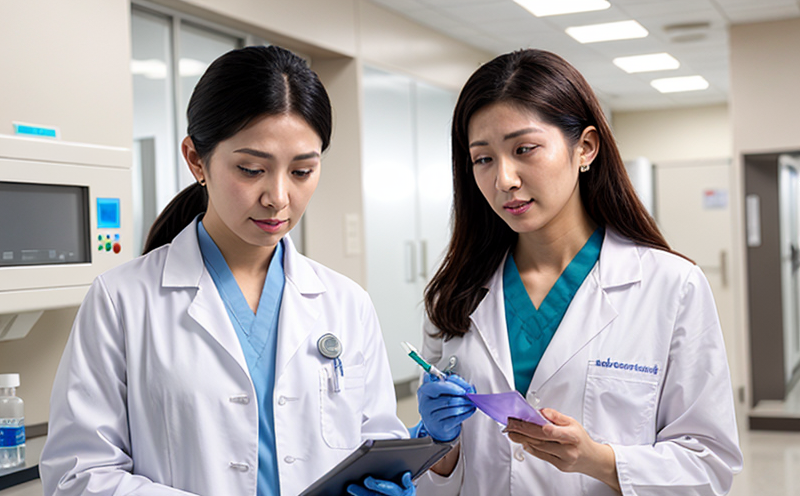ddPCR Detection of Residual Host DNA Testing
The ddPCR (Digital Droplet Polymerase Chain Reaction) method is a powerful and sensitive technique used in biopharmaceutical testing to detect residual host cell-derived DNA. This service plays a critical role in ensuring the purity and quality of therapeutic proteins, including monoclonal antibodies, recombinant proteins, and other biologics derived from mammalian cell lines such as Chinese hamster ovary (CHO), mammalian, or Escherichia coli (E. coli).
The presence of residual host DNA can lead to potential risks in the final product, including immunogenicity and safety concerns. Therefore, it is essential to establish robust testing protocols to quantify and qualify these impurities. The ddPCR method allows for highly accurate quantification by partitioning a reaction mixture into thousands of nanoliter-scale droplets. Each droplet undergoes an independent PCR amplification process, which increases the sensitivity of detecting low concentrations of residual DNA.
Our service involves several key steps: sample preparation, target capture, and data analysis. First, samples are prepared by extracting genomic DNA from both host cells and the final biopharmaceutical product using appropriate techniques like bead-beating or mechanical disruption followed by phenol-chloroform extraction. Next, specific probes designed to bind only to the target host DNA sequences are introduced into the reaction mixtures.
The ddPCR machine then partitions these samples into thousands of droplets. After amplification, the presence or absence of the target sequence is determined in each droplet by fluorescence intensity measurement post-PCR. This approach provides a binomial distribution that can be analyzed statistically to estimate the concentration of residual host DNA with high precision.
The sensitivity of ddPCR makes it particularly useful for detecting trace amounts of residual DNA, typically down to 0.1% or even lower depending on the sample matrix and experimental conditions. This level of detection is crucial during various stages of biopharmaceutical development, from process optimization through clinical trials up until commercial manufacturing.
Our laboratory adheres strictly to international standards such as ISO/IEC 17025 for quality management systems ensuring accurate results. Additionally, we follow FDA and EMA guidelines regarding biologics testing which emphasize the importance of residual DNA content in ensuring product safety and efficacy.
- Sample Preparation: Thoroughly disrupted cell lysates are prepared using optimized protocols to minimize sample matrix effects on ddPCR performance.
- Target Capture: Custom-designed probes ensure specific binding only to the intended host DNA sequences reducing false positives.
- Data Analysis: Advanced software tools analyze fluorescence intensity patterns across all droplets providing precise quantification of residual DNA levels.
In summary, our ddPCR detection service offers unparalleled sensitivity and reliability for monitoring residual host DNA in biopharmaceuticals. By incorporating this technology into your quality assurance processes, you can enhance the safety profile of your products while maintaining regulatory compliance requirements.
Scope and Methodology
The scope of our ddPCR detection service extends across multiple phases of biopharmaceutical development—from early-stage research to late-stage manufacturing. Our methodology focuses on ensuring that every batch of a therapeutic protein candidate meets strict purity standards set by regulatory authorities like the FDA, EMA, and WHO.
For each project, we design customized protocols tailored specifically to your product's unique characteristics. These include selecting appropriate host cell lines, determining optimal probe sets for target capture, establishing suitable sample preparation methods, and validating analytical techniques against known reference materials.
The core of our methodology lies in utilizing advanced ddPCR technology which offers several advantages over traditional qPCR (quantitative PCR) approaches:
- Higher sensitivity allowing detection down to 0.1% residual host DNA
- Better reproducibility due to the inherent nature of droplet-based partitioning
- Increased specificity through customized probe design targeting only desired sequences
We also incorporate quality control measures throughout all stages of testing including internal validation studies and method transfer protocols ensuring consistent results across different facilities.
In addition, our team works closely with clients to interpret findings within the context of broader regulatory expectations. This collaborative approach helps ensure that any detected residual host DNA can be managed effectively during development and production phases.
Quality and Reliability Assurance
To maintain the highest standards of quality and reliability in our ddPCR detection service, we employ rigorous quality control measures at every step of the process:
- Internal Validation: All assays undergo thorough validation following ISO/IEC 17025 standards to ensure accuracy and precision.
- Method Transfer Protocols: We follow strict protocols for transferring methods between laboratories ensuring consistent results across locations.
- Data Verification: Multiple checks are performed on raw data before final reports are generated to catch any errors or inconsistencies early.
- Continuous Improvement: Regular audits and updates based on new scientific developments ensure that our methodologies remain state-of-the-art.
By adhering strictly to these practices, we guarantee reliable outcomes every time. Our commitment to excellence ensures that you can trust us with your critical quality assurance needs.
International Acceptance and Recognition
The ddPCR detection of residual host DNA is widely accepted in the global pharmaceutical industry. Regulatory bodies like the FDA, EMA, and WHO recognize its importance for ensuring product safety and efficacy. Many leading biopharmaceutical companies incorporate this technology into their quality assurance protocols.
Our service aligns with international standards including ISO/IEC 17025 which govern laboratory operations and performance. Compliance with these guidelines ensures that our results are credible and can be trusted by regulatory agencies worldwide.





